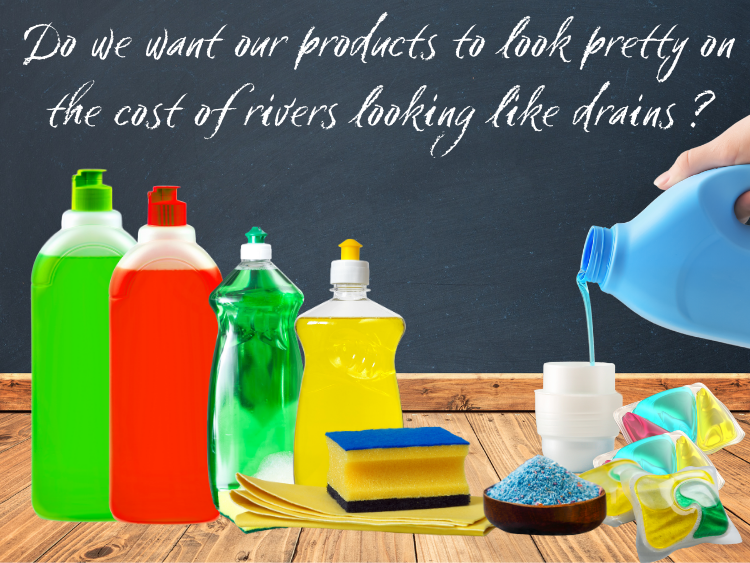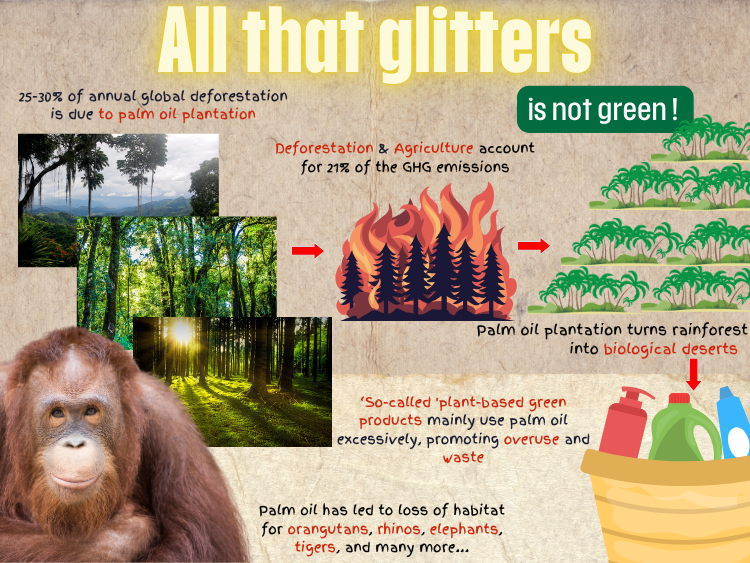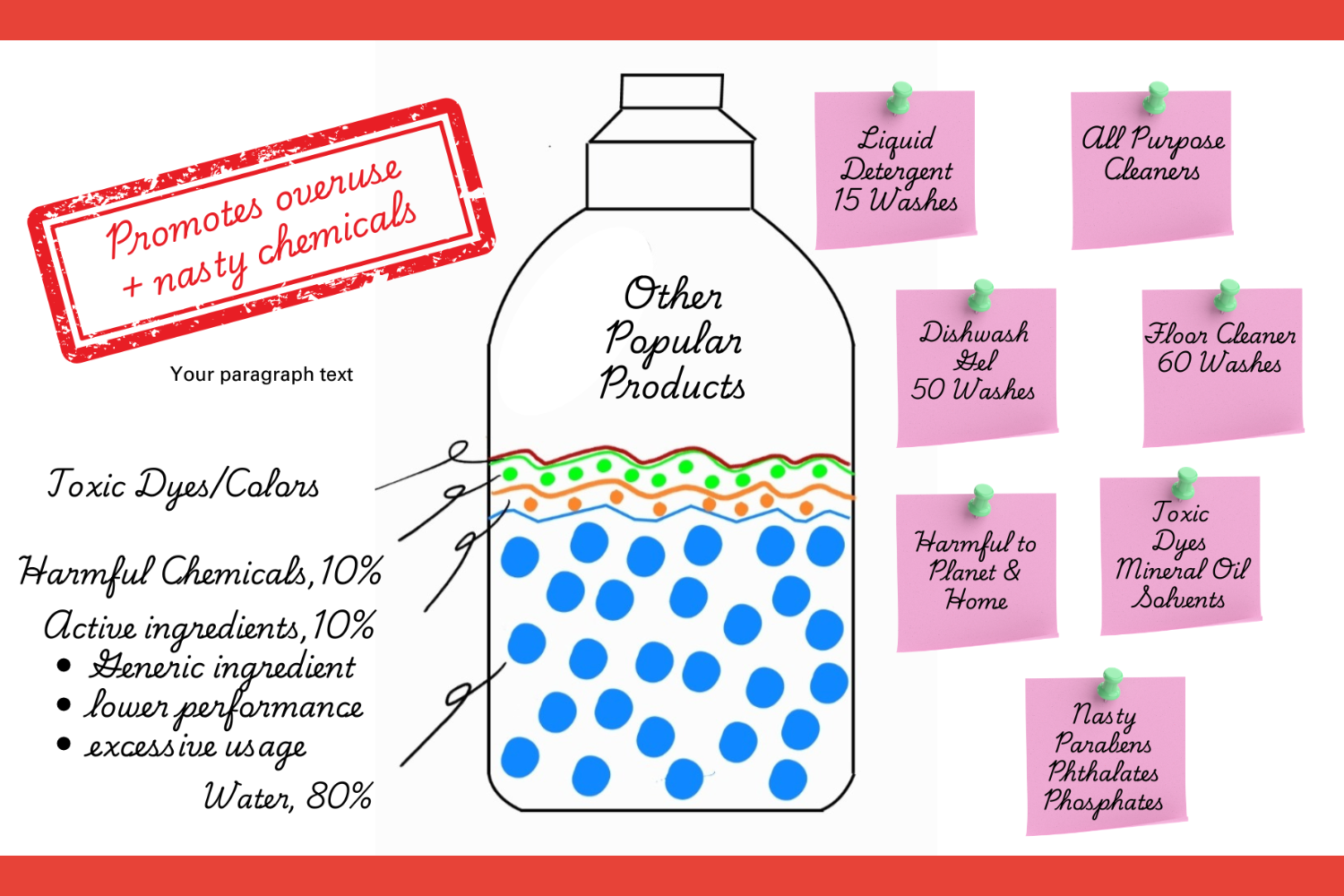What’s wrong in our current choices of household cleaners ?
Why does our choice of cleaner matter?
Recent findings reveal that a staggering 170 million gallons per day (MGD) of untreated wastewater flow into the Yamuna River. Alarmingly, 90% of domestic wastewater in the city, laden with detergent and laundry chemicals, ends up in the Yamuna. In 2020-21, Indian urban centres generated 72 billion litres of sewage, while the total installed sewage treatment capacity stood at 31 billion litres. Consequently, nearly two-thirds of untreated sewage discharge into rivers and eventually oceans. The foam we see in the Yamuna River in Delhi, Bellandur Lake in Bangalore, or Dadar Beach in Mumbai is a direct result of the reckless use of conventional cleaning products, which we have been using without a second thought.

Why all the cleaning products coloured – green, orange, pink, blue, etc.?
Nature's palette is vast, but it's unlikely to produce vibrant colors like sunset yellow, pink, green, and blue in cleaning products. The presence of these colors often indicates the use of artificial dyes, which can have negative environmental and health impacts. Some commonly used synthetic dyes include Brilliant Blue FCF, Tartrazine, Sunset Yellow, and Allura Red. The artificial dyes in products can harm aquatic ecosystems when washed into waterways. Even small amounts of synthetic dye can impact water quality, affecting aquatic life and photosynthesis. To minimize our environmental footprint, we at WashSalon rely solely on natural ingredients and minerals.
Why are cleaning products often formulated with harsh, toxic chemicals that harm our planet?
India's waterways are facing a significant challenge. Currently, only a third of household and industrial wastewater is treated by municipal bodies, leaving two-thirds to contaminate our rivers and oceans. The impact is evident in our ecosystems, such as the coral reefs in the Andamans, which are rapidly declining due to pollution. Our daily choices have a profound effect on the health of our planet. By making conscious decisions, we can help protect our vital waterways and preserve the beauty of our oceans.
Our research revealed a disturbing trend: many common cleaning products contain hazardous ingredients that can pose risks to human health and the environment.
Mineral oil as solvents (Silicone oils, turpentine oils, paraffin oil, etc.)
These are toxic in soil and water and not readily biodegradable. Therefore, mineral oil is an environmental contaminant.
Polymer-based Thickeners
Traditional cleaning products often prioritize appearance over sustainability, using thickening agents that may appeal to consumers but harm the environment. These non-biodegradable additives can persist in our ecosystems, causing long-term damage. At WashSalon, we're committed to a different approach, balancing performance with environmental responsibility.
Use of Phosphates to control water hardness
Phosphates can cause excessive algae growth in water bodies, leading to eutrophication. This depletes oxygen, harms aquatic life, and creates "dead zones". Phosphates can enter waterways through wastewater, industrial effluent, and agricultural runoff. This contributes to water pollution, harming aquatic ecosystems. In response to these concerns, many countries have implemented regulations or bans on the use of phosphates in various products. These restrictions aim to reduce phosphate pollution, protect aquatic ecosystems, and promote more sustainable practices. At WashSalon, we don’t use phosphates in any of our formula.
Banned Surfactants
Nonylphenol Ethoxylates (NPEs): Banned in the European Union and restricted in the United States due to their hormone-disrupting properties and environmental persistence.
Alkylphenol Ethoxylates (APEs): Restricted in the European Union and the United States due to concerns over their environmental persistence, bioaccumulation, and toxicity.
Perfluorinated Surfactants (PFS): Restricted in some countries due to concerns over their environmental persistence, bioaccumulation, and toxicity.
Phthalates
Phthalates are a group of chemicals used in a wide range of consumer products, including plastics, cosmetics, and personal care products. However, phthalates have been linked to various health and environmental concerns, making them harmful. These can interfere with the body's endocrine system, which regulates hormones. This can lead to reproductive issues, birth defects, and developmental problems. Exposure to phthalates has also been linked to reduced fertility, low birth weight, and reproductive tract abnormalities. These can contaminate waterways, harming aquatic life and potentially entering the food chain. At WashSalon, we don’t stay away from phthalates in any of our formula.
Optical brighteners
These are chemicals added to laundry detergents, paper, and textiles to absorb ultraviolet light and emit blue light, making them appear brighter and whiter. However, OBs have been linked to several environmental and health concerns, making them harmful. It can accumulate in aquatic organisms, potentially harming them and contaminating the food chain. It can cause skin irritation, allergic reactions, contact dermatitis, and if inhaled, asthma in some individuals. It can disrupt ecosystems by altering the natural balance of aquatic environments.

Can we clean with a clear conscience using plant-derived cleaning products?
According to the Intergovernmental Panel on Climate Change (IPCC) and the Food and Agriculture Organization (FAO) of the United Nations, Agriculture accounts for around 14-15% of global greenhouse (GHG) emissions and Deforestation and land-use changes account for around 6-8% of global GHG emissions. To put this into perspective, the impact is similar in scale to the greenhouse gas emissions from chemical production, which account for a staggering 21% of global GHG emissions.
Palm oil serves as a vital raw material in the production of active ingredients that provide the cleaning power in our products. Palm oil production has been linked to widespread deforestation, habitat destruction, and biodiversity loss. Southeast Asia is the world's largest producer of palm oil, accounting for around 80% of global production and also ships to India.
Palm oil production has been linked to widespread deforestation, habitat destruction, and biodiversity loss. Indonesia and Malaysia are the two largest palm oil-producing countries in the region. In Indonesia Sumatra Island widespread deforestation has led to loss of orangutan and tiger habitats. In Malaysia's Sarawak State, deforestation has resulted in the loss of indigenous communities' lands and forests. In Ecuador, Palm oil production has led to deforestation and habitat loss for endangered species like the jaguar and puma.
All that glitters is not green!
While plant-derived products offer numerous benefits, their rapid growth poses significant environmental risks, including deforestation and accelerated global warming. At WashSalon, we acknowledge this challenge and prioritize mindful optimization. We carefully handpick ingredients that do not contribute to these environmental concerns. As the situation evolves, we remain vigilant and committed to innovation, ensuring our products not only benefit our customers but also the planet.



